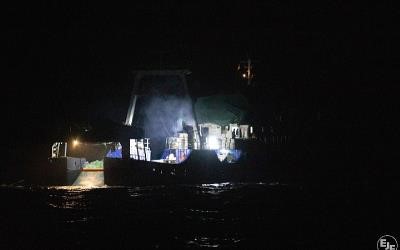The Lu Rong Yuan Yu 956 has been detained again for the same illegal fishing crimes as it was apprehended for a year ago. In 2019 the vessel operators were issued with a fine for using under-size mesh nets and taking fish below minimum landing size: despite refusing to pay, the vessel had its licence renewed. Last month the Marine Police apprehended it again under almost identical charges.
This blatant disregard for the law is enabled by a lack of deterrent sanctions and the decision – taken by government officials in the full knowledge of these crimes – to re-licence the vessel before the fine was paid, says the Environmental Justice Foundation (EJF). If the government does not crack down on these practices it will endanger the livelihoods and food security of millions of Ghanaians.
The Lu Rong Yuan Yu 956 was initially apprehended in June 2019 for using nets with a mesh size below the legal minimum and taking fish smaller than legal landing size. The vessel operators had failed to declare the catches at port; according to the authorities, they planned to trade them illegally at sea in a practice known as ‘saiko’.
In October 2019, the owners were issued with a fine of US$1 million by an out of court settlement committee, and an additional GHS 124,000 for the fish on board the vessel. However, the owners refused to pay the fine and the case returned to court. Despite this, the vessel licence was renewed, and the trawler put to sea again, fishing in the waters of both Ghana and neighbouring Cote d’Ivoire.
On 30 May 2020, the Marine Police apprehended the vessel again, and again the charges brought were nets with a mesh size below the legal limit and under-sized fish. The Lu Rong Yuan Yu 956, which is operated by the Chinese company Rongcheng Ocean Fishery Co Ltd, will be detained until June 16, 2020, when the case is due to come before court.
Around 90% of Ghana’s industrial fishing fleet is linked to Chinese ownership, an EJF investigation revealed in 2018 . As Ghana’s fisheries laws prohibit foreigners from engaging in joint ventures in the industrial trawl sector, Chinese organisations operate through Ghanaian ‘front’ companies, using opaque corporate structures to import their vessels, register and obtain a licence.
These repeat offences show that the system of sanctions in Ghana is not having a deterrent effect, says EJF. Under international law, Ghana has a responsibility to establish and implement a system of deterrent sanctions that deprives offenders of the benefits flowing from their illegal fishing activities. The fact that the vessel was authorised by the Ghanaian authorities to fish in Cote d’Ivoire, despite its failure to pay a fine for serious illegal fishing offences, shows that Ghana’s decisions on these cases have international importance.
The use of under-size nets is often associated with the damaging practice of saiko, as trawlers use them to illegally target the main catch of Ghanaian canoe fishers – small pelagic fish, also known as the ‘people’s fish’. Once caught, they transfer the catch at sea to specially adapted boats and sell this stolen fish back to local communities at a profit.
EJF’s Executive Director Steve Trent said, “It is vital to ensure that the vessel pays the full fines of both cases, and that the outcome of this and other cases are published on the Ministry’s website. Perpetrators cannot simply choose not to pay a fine and go back to exactly the same criminal actions as before. That is not how justice works. To safeguard Ghana’s food security, livelihoods and stability, the government must act to tackle this issue across the whole fleet.”










